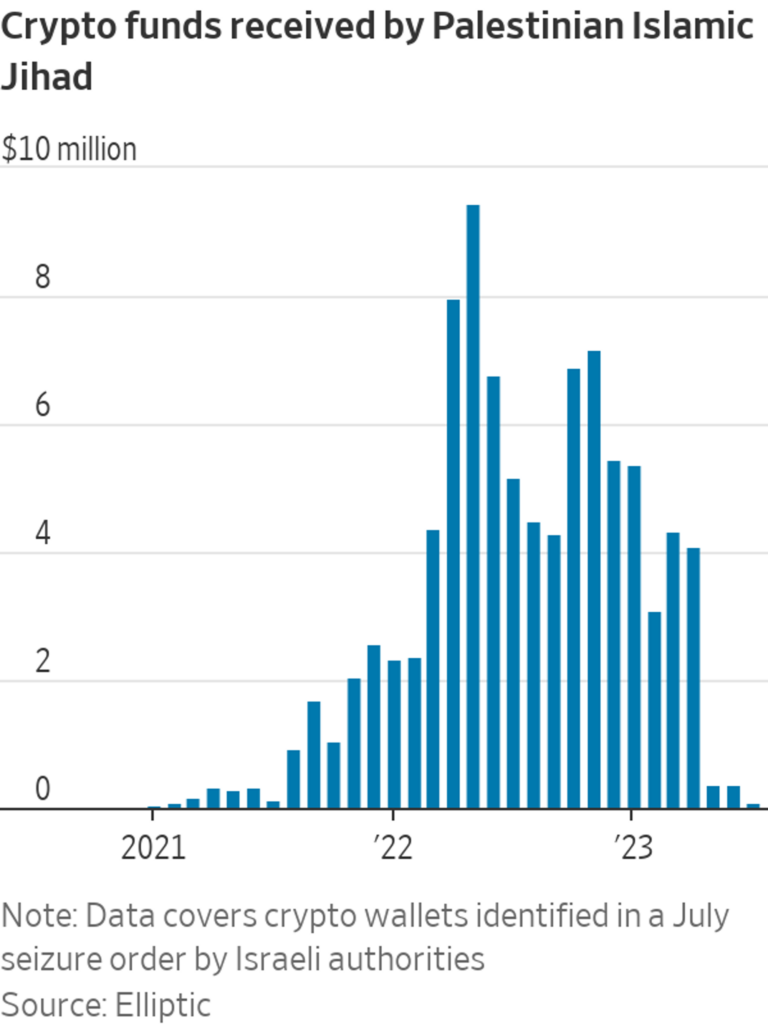Fear, Uncertainty, and Doubt (FUD) are not new to crypto.
Often, it is used to manipulate the market and control the user sentiment. Let’s analyze the biggest FUD of 2023.
What’s Behind Crypto FUD in 2023?
In recent news, more than 100 U.S. Senators, led by Sen. Elizabeth Warren, penned a letter to the Biden administration on October 17th. The letter raised concerns about how Hamas and the Palestinian Islamic Jihad (PIJ) allegedly raised millions of dollars through cryptocurrency.
U.S. Senator Elizabeth Warren sent a letter to President Joe Biden urging his administration to leverage all tools and resources available to the United States to provide relief to India. pic.twitter.com/MEa57rR5wb
— DD India (@DDIndialive) May 1, 2021
Specifically, the letter highlighted that the two groups had collectively garnered over $130 million in crypto between August 2021 and June 2023. The Senators demanded information on the actions taken by the Treasury Department and other entities to prevent the use of crypto in financing terrorism.
The impact of the letter was evident, as less than 24 hours later, the U.S. Treasury Department announced sanctions against several individuals and entities reportedly supporting Hamas’s operations.
However, it’s noteworthy that this series of events was triggered by an emphasis on crypto’s role in funding Hamas, raising questions about the narrative surrounding cryptocurrency’s involvement in terrorism financing.
Misinformation Campaign?
The data on terrorism financing mentioned in Sen. Warren’s letter stemmed from a Wall Street Journal (WSJ) news report released on October 10th. Notably, the WSJ report attributed its information to findings by blockchain forensics firm Elliptic and Tel Aviv software company BitOK.
According to the WSJ report, citing Elliptic’s July 2023 findings. The Palestinian Islamic Jihad (PIJ) purportedly received $93.7 million in crypto between August 2021 and June 2023. Additionally, citing a BitOK research report, WSJ claimed that Hamas received approximately $41 million over the same period.
It’s crucial to provide context by considering estimates from Matthew Levitt, a former senior Treasury official, who assesses Hamas’s annual operating budget to be between $300 million and $450 million.
Notably, a significant portion of this budget, approximately $100 million annually, is known to be provided by Iran. Based on the WSJ report, crypto donations would constitute roughly 10% to 20% of Hamas’s annual funding.
While the numbers are substantial, skepticism emerged within the industry due to the public nature of blockchains and the current capabilities of blockchain analytics. Many questioned the accuracy of the WSJ’s figures, considering that most crypto donations to Hamas could be traceable. Making them subject to immediate sanctions or freezing.
Hamas itself informed its supporters in April 2023 that it would no longer accept crypto donations.
The Aftermath
In response to the controversy stirred by the Wall Street Journal report, blockchain analytics firm Chainalysis conducted an investigation. They released a report on October 18th, debunking the data quoted by WSJ.
According to Chainalysis, the actual figure was approximately $450,000, not the reported $82 million. A week later, Elliptic, the organization whose report WSJ relied on, also clarified, stating that the WSJ team had misinterpreted the data in its July report.
The critical error in WSJ’s reporting was revealed as the publication had attributed all funds held in the wallets of service providers. They were used by Hamas for funds raised by Hamas. In reality, only a small portion of those funds belonged to the group.
Elliptic corrects the record. Your move, @wsjhttps://t.co/eDXmsRAPhq
— nic 🌠 carter (@nic__carter) October 25, 2023
Given that the WSJ report resulted in the spread of a false narrative by U.S. politicians, numerous voices within the crypto space urged WSJ to either retract or issue a clarification. While WSJ eventually posted a clarification on its October 10th report, it initially resisted admitting fault.
Source: The WSJ
Ian Talley, one of the authors of the WSJ report, went as far as writing an extensive Twitter thread attempting to portray Elliptic’s recent clarification as a contradiction of its earlier July report.
Elliptic 10/25/23, “There is no evidence to support the assertion that Hamas has received significant volumes of crypto donations.”
"…there is no evidence to suggest that crypto fundraising has raised anything close to this amount, and data provided by Elliptic and others has… pic.twitter.com/mIHobGoZh9— Ian Talley (@IanTalley) October 25, 2023
However, the X community notes feature fact-checked Talley’s claims, exposing how he selectively presented text to support his narrative. Users pointed out that the original report explicitly states, “wallets & funds are related to but not owned by groups mentioned, and include funds in broker wallets.”
Despite the clarification, it is unlikely to deter critics like Sen. Warren from their negative stance on the crypto industry, as peddling misinformation can be more convenient when it aligns with certain agendas.
Disclaimer
The information discussed by Altcoin Buzz is not financial advice. This is for educational, entertainment, and informational purposes only. Any information or strategies are thoughts and opinions relevant to the accepted levels of risk tolerance of the writer/reviewers and their risk tolerance may be different than yours. We are not responsible for any losses that you may incur as a result of any investments directly or indirectly related to the information provided. Bitcoin and other cryptocurrencies are high-risk investments so please do your due diligence. Copyright Altcoin Buzz Pte Ltd.






























